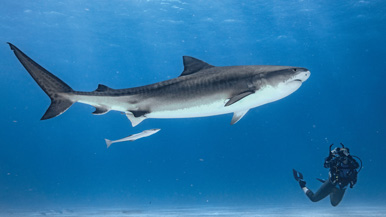
Eight years ago, Brynne Rardin, fresh out of college, was attempting to steer a boat through crashing waves at two in the morning, feeling miserably seasick, and seriously questioning her choices.
Inspired by a swim with dusky dolphins during her New Zealand study abroad program, the New Hampshire native had embarked on a gap year to travel and scuba dive before pursuing a PhD in sports psychology. She had impetuously applied to work as a chef on a liveaboard dive boat in the Caribbean, but the last thing she wanted to do was think about food, much less prepare it.
Then the boat cruised into the dazzling turquoise waters of Turks and Caicos, and Rardin knew she’d made the right decision.
It turned out to be one that changed her life. When Rardin wasn’t holed up in the galley, she explored the underwater world, communing with humpback whales off the Dominican Republic and staring into the eyes of a tiger shark in the Bahamas.
“I hadn’t realized that tiger sharks have these beautiful amber irises, very human-looking,” Rardin says. The encounters made her consider how connected—and yet how disconnected—humans are from other life on the planet.
Rardin started to document these adventures with videos, which helped her parents understand what she was doing and helped guests appreciate what they were seeing. The boat company made her a dive master and video pro, but she wanted to do more to support oceans.
“How crazy would it be if I made my career conservation filmmaking?” she recalls thinking. “That can’t be a thing.”
Through a fellowship at the Coral Restoration Foundation, based in the Florida Keys, Rardin expanded her video skills and her knowledge of reefs. She became “very much a coral nerd,” she says. “Seeing healthy reefs is one of the most beautiful things, because it’s a metropolis—it’s just underwater.”
Now, in addition to working as a communications manager at the Blacks of the Chesapeake Foundation, she won a Pathfinder Prize grant to direct a documentary about Honduran coral reefs that are surviving in our warming world against all odds.
She has learned drone photography to show the beauty of oceans from above and launched an eco-friendly clothing company called Ofauna that makes rash guards from recycled plastic water bottles and her hand-drawn designs of sea life.
And Rardin is back at school—not for sports psychology but environmental filmmaking. She says AU’s MFA program is giving her the fundamentals and networking she needs to reach her goal: to connect people to the natural world so they’ll want to protect it.
Naturally, she’s diving in.